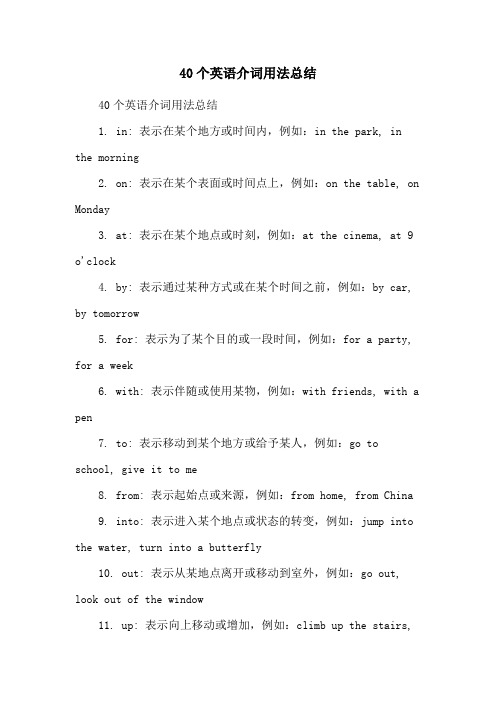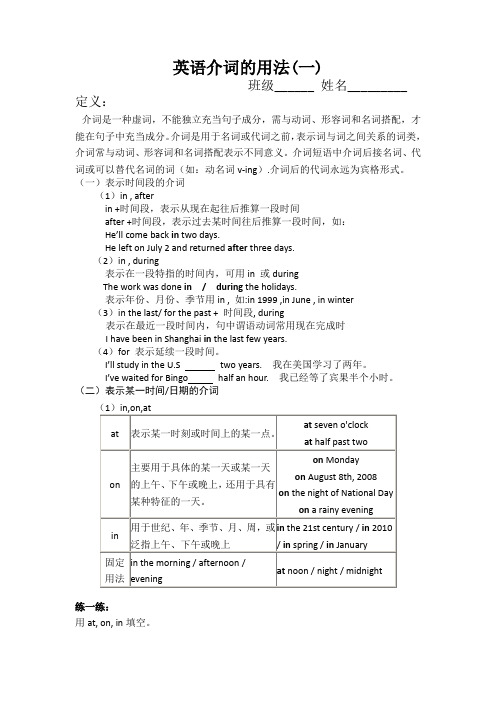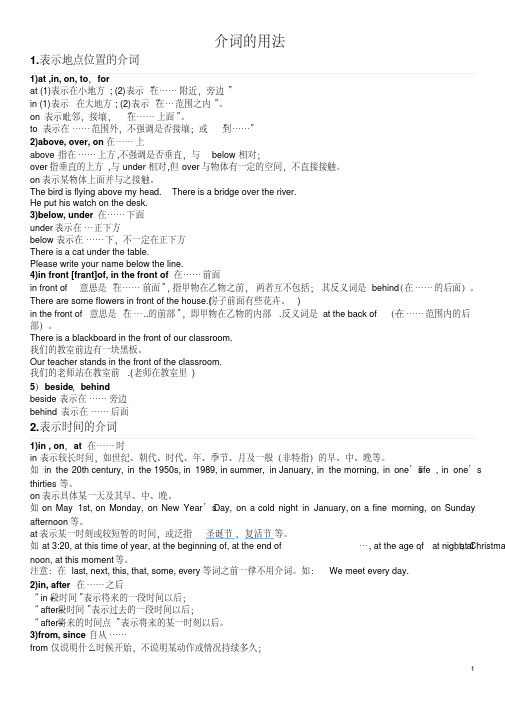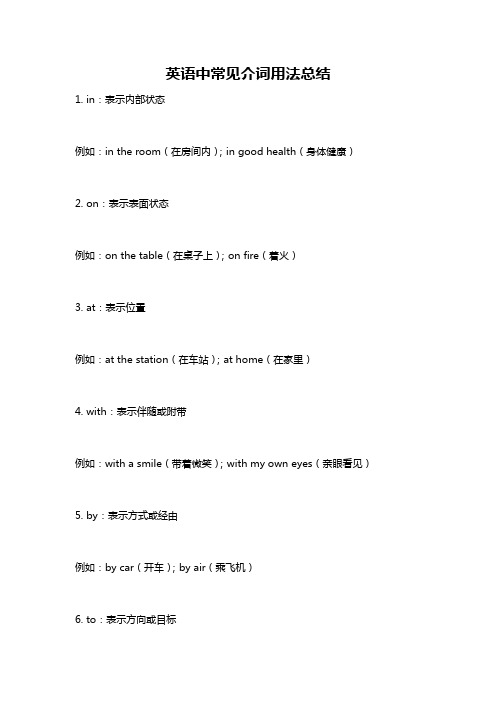英语中介词的用法
40个英语介词用法总结

40个英语介词用法总结40个英语介词用法总结1. in: 表示在某个地方或时间内,例如:in the park, in the morning2. on: 表示在某个表面或时间点上,例如:on the table, on Monday3. at: 表示在某个地点或时刻,例如:at the cinema, at 9 o'clock4. by: 表示通过某种方式或在某个时间之前,例如:by car, by tomorrow5. for: 表示为了某个目的或一段时间,例如:for a party, for a week6. with: 表示伴随或使用某物,例如:with friends, with a pen7. to: 表示移动到某个地方或给予某人,例如:go to school, give it to me8. from: 表示起始点或来源,例如:from home, from China9. into: 表示进入某个地点或状态的转变,例如:jump into the water, turn into a butterfly10. out: 表示从某地点离开或移动到室外,例如:go out, look out of the window11. up: 表示向上移动或增加,例如:climb up the stairs,wake up12. down: 表示向下移动或减少,例如:walk down the hill, calm down13. about: 表示关于某事或在某个范围内,例如:talk about the movie, wander about the city14. off: 表示离开或关闭,例如:get off the bus, turnoff the lights15. on: 表示打开或激活,例如:turn on the TV, switch on the computer16. over: 表示越过或在某地上方,例如:jump over the fence, fly over the city17. under: 表示在某物下面或被控制或影响,例如:hide under the bed, live under his rules18. with: 表示具有某种特征或和某人一起做某事,例如:a man with blue eyes, dance with me19. without: 表示没有某物或在缺乏某物的情况下,例如:go without food, live without regret20. by: 表示通过某种方式,例如:learn by doing, go by bus21. through: 表示穿过某物或完成某事,例如:walk through the door, go through the documents22. across: 表示横穿某物或在某个范围内,例如:swimacross the river, all across the world23. between: 表示在两个事物之间或在某个时间段,例如:choose between two options, between 9 and 10 o'clock24. among: 表示在三个或三个以上事物之间或在某群人中,例如:share among friends, discuss among colleagues25. around: 表示在周围或在某个时间点附近,例如:walk around the park, around midnight26. through: 表示通过某事物或在某段时间内,例如:read through the book, work through the night27. against: 表示反对或靠在某物上,例如:fight against injustice, lean against the wall28. for: 表示代表或支持某人或某事,例如:vote for a candidate, fight for freedom29. towards: 表示朝向某个方向或对某人有好感,例如:walk towards the beach, feel towards someone30. within: 表示在某个时间或范围内,例如:arrive within an hour, within the city limits31. beyond: 表示超出某个界限或超过某个程度,例如:beyond expectations, beyond the horizon32. along: 表示沿着某个路线或伴随某人一起,例如:walk along the street, sing along with the song33. above: 表示在某物之上或高于某个程度,例如:flyabove the clouds, above average34. below: 表示在某物之下或低于某个程度,例如:swim below the surface, below freezing35. beside: 表示在某物旁边或和某人一起,例如:sit beside me, beside the lake36. near: 表示在某物附近或接近某个时间,例如:live near the beach, near the end37. past: 表示经过某个地点或在某个时间之后,例如:walk past the store, past midnight38. around: 表示在周围或大约某个数量,例如:look around the room, around 20 people39. after: 表示在某个时间之后或追求某人或某事,例如:after dinner, run after the dog40. before: 表示在某个时间之前或在某个事件之前,例如:before sunrise, before the meeting这些介词是英语中常用的一些基本介词,它们在表达地点、时间、方式等方面起到了重要的作用。
英语介词的用法

英语介词的用法(一)班级______ 姓名_________定义:介词是一种虚词,不能独立充当句子成分,需与动词、形容词和名词搭配,才能在句子中充当成分。
介词是用于名词或代词之前,表示词与词之间关系的词类,介词常与动词、形容词和名词搭配表示不同意义。
介词短语中介词后接名词、代词或可以替代名词的词(如:动名词v-ing).介词后的代词永远为宾格形式。
(一)表示时间段的介词(1)in , afterin +时间段,表示从现在起往后推算一段时间after +时间段,表示过去某时间往后推算一段时间,如:He’ll come back in two days.He left on July 2 and returned after three days.(2)in , during表示在一段特指的时间内,可用in 或duringThe work was done in / during the holidays.表示年份、月份、季节用in , 如:in 1999 ,in June , in winter(3)in the last/ for the past + 时间段, during表示在最近一段时间内,句中谓语动词常用现在完成时I have been in Shanghai in the last few years.(4)for 表示延续一段时间。
I’ll study in the U.S two years. 我在美国学习了两年。
I’ve waited for Bin go half an hour. 我已经等了宾果半个小时。
(二)表示某一时间/日期的介词练一练:用at, on, in填空。
1. ________ five o’clock2. _________ a quarter past seven3. ________ February 11th4. _________ a hot summer afternoon5. ________ winter6. ________ the evening7. ________ night 8. ________ the morning of Children’s Day(2)before, bybefore 表示某一时间之前,而by 表示到某一时间止,句中谓语动词多用完成时态。
英语介词用法详解

英语介词用法详解英语介词是连接词与词之间关系的重要语法成分,它们用于表示空间、时间、关系等概念。
正确的使用介词是英语学习的基础之一。
本文将详细介绍英语介词的常见用法。
一、表示方向和位置的介词1. In(在):用于大的地点范围之内,表示“在……里面”。
- There is a book on the desk.- I live in New York.2. On(在、在上、在……上面):用于平面、表面或边界之上。
- The cat is on the table.- The painting hangs on the wall.3. At(在、在……附近):用于特定的地点或位置。
- I met him at the park.- We will meet at the restaurant.4. Under(在……下面):表示相对高度或遮挡。
- The cat is under the table.- He found his keys under the sofa.5. Behind(在……后面):表示在某物后面。
- The car is parked behind the house.- She is hiding behind the tree.6. Beside(在……旁边):表示在某物的旁边。
- My house is beside the park.- She sat beside her friends.7. Inside(在……里面):表示在某物的内部。
- The wallet is inside the bag.- There is a surprise inside the box.8. Outside(在……外面):表示在某物的外部。
- The children are playing outside the house.- Don't forget to lock the door when you go outside.二、表示时间的介词1. On(在某天):用于特定的日期。
英语中介词的用法

介词的用法一、介词的定义:介词为虚词,是一种用来表示词与词或者词与句之间的关系的词,在句中不能单独作句成分。
介词一定要有宾语,构成介词短语(即介宾结构),才能充当句子成分。
充当宾语的一般有名词、相当于名词的其它词、代词、形容词、短语或句子、短语或从句等,介词短语在句中常作定语、状语、表语和补足语。
二、介词的分类:1.简单介词:about, across, after, against, among, around, at, before, behind, below, beside, between, beyond, but, by, down, during, except, for, from, in, like, of, off, on, over, near, past, round, since, through, till, to, toward(s), under, until, up, with, per, via;2.合成介词:inside, into, onto, out of, outside, throughout, upon, within, without;3.短语介词:according to, along with, apart from, as for, as to, because of, by means of, in front of, instead of, on account of, on behalf of, owing to, due to, up to。
4.双重介词:如from behind, from among, until after, at about等。
三、介词的宾语1.名词:Let’s go for a walk along th e river. 咱们到江边散散步。
2.代词:He’s standing in front of me. 我站在我前面。
英语介词的用法总结(完整版)

介词的用法1.表示地点位置的介词1)at ,in, on, to,forat (1)表示在小地方; (2)表示“在……附近,旁边”in (1)表示在大地方; (2)表示“在…范围之内”。
on 表示毗邻,接壤,“在……上面”。
to 表示在……范围外,不强调是否接壤;或“到……”2)above, over, on 在……上above 指在……上方,不强调是否垂直,与below相对;over指垂直的上方,与under相对,但over与物体有一定的空间,不直接接触。
on表示某物体上面并与之接触。
The bird is flying above my head. There is a bridge over the river.He put his watch on the desk.3)below, under 在……下面under表示在…正下方below表示在……下,不一定在正下方There is a cat under the table.Please write your name below the line.4)in front [frant]of, in the front of在……前面意思是“在……前面”,指甲物在乙物之前,两者互不包括;其反义词是behind(在……的后面)。
in front of…There are some flowers in front of the house.(房子前面有些花卉。
)in the front of 意思是“在…..的前部”,即甲物在乙物的内部.反义词是at the back of…(在……范围内的后部)。
There is a blackboard in the front of our classroom.我们的教室前边有一块黑板。
Our teacher stands in the front of the classroom.我们的老师站在教室前.(老师在教室里)5)beside,behindbeside 表示在……旁边behind 表示在……后面2.表示时间的介词1)in , on,at 在……时in表示较长时间,如世纪、朝代、时代、年、季节、月及一般(非特指)的早、中、晚等。
英语中常见介词用法总结

英语中常见介词用法总结
1. in:表示内部状态
例如:in the room(在房间内);in good health(身体健康)2. on:表示表面状态
例如:on the table(在桌子上);on fire(着火)
3. at:表示位置
例如:at the station(在车站);at home(在家里)
4. with:表示伴随或附带
例如:with a smile(带着微笑);with my own eyes(亲眼看见)5. by:表示方式或经由
例如:by car(开车);by air(乘飞机)
6. to:表示方向或目标
例如:to the park(去公园);to the moon(到月球)
7. from:表示出发地或来源
例如:from Beijing(来自北京);from the magazine(从杂志中)
8. for:表示目的或用途
例如:for a birthday party(为了生日派对);for writing(用于写作)
9. of:表示属于或关系
例如:the book of Harry Potter(哈利·波特的书);the sister of Mary(玛丽的姐姐)
10. with:表示具有或伴随
例如:a man with a gun(拿着枪的人);a girl with long hair(长发女孩)。
英语中的介词用法与常见短语搭配
介词在英语中起到连接词语或短语的作用,用于表示方向、位置、时间、原因、手段等关系。
正确使用介词是学好英语的关键之一。
下面我们将介绍几个常用的介词用法和一些常见的短语搭配。
1.In "In" 是一个非常常见的介词,表示在某个位置、时间或范围内。
例如:•I live in Beijing.(我住在北京。
)•The book is in my bag.(这本书在我的包里。
)•Let's meet in the afternoon.(下午我们见面吧。
)2.On "On" 也是一个常见的介词,表示在某个平面或表面上。
例如:•The book is on the table.(这本书在桌子上。
)•She is standing on the stage.(她站在舞台上。
)•Let's meet on Monday.(我们星期一见面吧。
)3.At "At" 表示一个具体的位置或时间点。
例如:•I am at school.(我在学校。
)•They arrived at the airport.(他们到达了机场。
)•Let's meet at 7 o'clock.(我们7点见面吧。
)4.By "By" 用于表示手段、方法、交通工具等。
例如:•I go to work by bus.(我坐公交车上班。
)•She wrote the letter by hand.(她亲手写了那封信。
)•Let's go there by taxi.(我们坐出租车去那里吧。
)5.For "For" 可以表示出于某个目的或用途。
例如:•I bought this book for my sister.(我给我妹妹买了这本书。
)•He is studying for the exam.(他在为考试学习。
(完整版)英语中介词的用法
介词的用法一、表示时间日期的介词1.at:主要表示方向、场所、时间的某一点at the corner of the street,at dinner,at sixty miles an hour,be sold at three yuan a dozen,come at us固定搭配:at one time,at the beginning of,at the post office,at the airport,at the weekend,at the age of25,at the same time,at present,at any time,表示原因,表示“见/闻……而”。
at the news at主要表示时间点表示特定的时间at night a.m.在九点钟表示不确定的时间at night,at that time,at Christmas 在圣诞期间当天on表示年龄段at the age of eight在8岁2.in:表示场所、时间与期限、状况、方向。
主要用来表示较长的时间单位,如月份、季节、年份等in the1990s in the late19th century形成“in+时段名词”的词组或固定搭配in those days,in the daytime,in a short while,in no time,in time.in主要表示时间段一般指相对较长的时间段里in the morning,in spring,in the past ten years在…时间之后,用于将来时He will be back in a month.介词in在短语或句型中的省略:1)某些形容词/过去分词后接v-ing形式时,v-ing形式前的介词in可以省略。
be busy(in)doing be engaged(in)doing(忙于……)2)某些动词如busy等,常与反身代词连用,其后的in也可以省略。
英语介词用法
adv.
(放, 穿, 连接)上
He has new shoes on.
他穿上新鞋。
向前, (继续)下去
She worked on quietly all night.
她整个晚上默默地继续工作。
4、with
prep.
(表示关系)和…在一起
一年半的战争之后俄国被击败了。
He left here after our arrival.
我们到达之后他离去了。
I seldom go out after 10 o'clock.
我在十点钟之后很少出去。
3、on
prep.
(表示位置)在…上, 在…旁, 在…身边
他身体虚弱, 因此更增加了他的困难。
然后, 接着
It came nearer and nearer.
那东西越来越近了。
而且, 还, 又
Mary was tall and fair.
玛丽是个高个子的金发女郎。
连接并列的名词、代词或数词]同, 和, 与, 如: Father and I went to Xinhua bookstore yesterday. 父亲和我昨天到新华书店去过。
我没有回答, (而)他也不作声。
[连接两个句子, 后者表示结果]只要...就会; 那么
Go at once and you will see her.
马上去, 那么你就会见到她了。
[连接两个相同的词]反复, 一再
We talked and talked.
我们说呀, 说呀, 说个没完。
士兵们立正站着。
(表示方式)以…的方式; 通过一次…的动作
英语语法:介词用法
英语语法:介词用法介词在英语语法当中是非常常用的一种语法结构,那么作为常用的语法我们该如何学好呢,下面就是小编给大家带来的英语语法:介词用法,希望能帮助到大家!介词的用法一:一、介词to的常见用法1.动词+toa)动词+ toadjust to适应,attend to处理;照料,agree to赞同,amount to加起来达…,belong to属于,come to达到,drink to为…干杯,get to到达,happen to发生在某人身上,hold to紧握,lead to通向,listen to听,occur to想起,object to反对,point to指向,respond to回答,refer to参考;指的是…;涉及,reply to回答,see to负责,stick to坚持,turn to求助,write to给某人写信。
b)动词(+sth.)+to+sb.announce to通知某人, describe to向某人描述, explain to 向某人解释, express to对某人表达, mention to提及, nod to向某人点头,report to报告,say to告知,shout to对某人大叫,suggest to对某人提建议,speak to与某人交谈,talk to跟某人谈话, whisper to和某人低声耳语。
c)动词+sth./sb.+ to +sth./sb.add to增加, compare to比作, carry to运送至, devote to 致力于,introduce to介绍给, invite to邀请参加, join to连接到,leave to委托给,reduce to下降至, sentence to判处, take to带到。
2. be +形容词/过去分词+ tobe alive to觉察;晓得,be attentive to注意;留心,be awake to知晓,be blind to缺乏眼光,be close to紧挨着,be common to对某人来说很普通,be contrary to违反;反对,be devoted to致力,be deaf to不愿意听,be equal to有…的力量,be exposed to暴露;遭受,be fair to对…公平,be familiar to对某人来说熟悉,be grateful to对某人心存感激,be good to对…有好处,be harmful to对…有危害,be important to对…重要,be kind to友好对待,be known to周知于,be married to嫁给,be moved to转移到,be near to靠近,be necessary to对…有必要,be opposite to在对面,be opposed to反对,be pleasant to合某人之意,be proper to专属,be polite to礼貌待人,be rude to粗暴对待,be relative to与…有关,be strange to不习惯,be similar to类似,be suitable to适合,be true to忠实,be thankful to感激,be useful to对…有用,be used to习惯。
- 1、下载文档前请自行甄别文档内容的完整性,平台不提供额外的编辑、内容补充、找答案等附加服务。
- 2、"仅部分预览"的文档,不可在线预览部分如存在完整性等问题,可反馈申请退款(可完整预览的文档不适用该条件!)。
- 3、如文档侵犯您的权益,请联系客服反馈,我们会尽快为您处理(人工客服工作时间:9:00-18:30)。
介词的用法一、介词的定义:介词为虚词,是一种用来表示词与词或者词与句之间的关系的词,在句中不能单独作句成分。
介词一定要有宾语,构成介词短语(即介宾结构),才能充当句子成分。
充当宾语的一般有名词、相当于名词的其它词、代词、形容词、短语或句子、短语或从句等,介词短语在句中常作定语、状语、表语和补足语。
二、介词的分类:1.简单介词:about, across, after, against, among, around, at, before, behind, below, beside, between, beyond, but, by, down, during, except, for, from, in, like, of, off, on, over, near, past, round, since, through, till, to, toward(s), under, until, up, with, per, via;2.合成介词:inside, into, onto, out of, outside, throughout, upon, within, without;3.短语介词:according to, along with, apart from, as for, as to, because of, by means of, in front of, instead of, on account of, on behalf of, owing to, due to, up to。
4.双重介词:如from behind, from among, until after, at about等。
三、介词的宾语1.名词:Let’s go for a walk along th e river. 咱们到江边散散步。
2.代词:He’s standing in front of me. 我站在我前面。
3.形容词:Her pronunciation is far from perfect. 她的语音远不是完美的。
【注意】有的形容词前可看作是省略了being。
4.动名词:He’s good at drawing.他善长绘画。
5.过去分词:I took it for granted that she was for England.我还以为她是英国的。
【注意】过去分词作介词宾语只限于take…for granted, regard…as, than expected后。
6.不定式:I had no choice but to lie down. 除了躺下外我别无选择。
She did nothing but cry.她只是哭。
【注意】介词后通常是不能用不定式作宾语,只有表示“除……外”的介词but能接不定式作宾语。
前面有行为动词do时,不定式不用to,否则要带to。
7.疑问词+不定式:I don’t know how to improve my English.我不知道如何提高我的英语水平。
8.副词:I didn’t know it until recently. 直到最近我才知道此事。
9.数词:He was among the first to arrive. 他是第一批到的。
10.介词短语:She won’t go home until after the exam. 她要考完试之后再回家。
11.从句:Think of what I said. 想想我说的话。
I’m worried about where he is. 我担心他上哪儿去了。
I have doubts about whether (不用if) he is the best man for the job.我怀疑他是否做这项工作的最好人选。
He has no special fault except that he smokes too much.他除了抽烟太多之外,没有什么特别的毛病。
【注意】除except that, in that等后可接that从句外,介词通常只接连接代词、连接副词及whether引导的从句,也不接if引导的从句。
四、介词的作用:1.作定语:The key to the door is missing. 门上的钥匙丢了。
【注意】介词短语作定语总是放在它所修饰的名词后面。
2.作状语:Marx stayed in Belgium for some time and then went to France.马克思在比利时带了一段时间,然后去了法国。
3.作表语:Japan is to the east of China. 日本在中国的东面。
I always find her at her studies. 我经常发现她在学习。
4.作宾语补足语:Make yourself at home. 别拘谨。
5.作介词宾语:I saw her from across the street. 我从街对面望见了她。
五、常见介词的基本含义:(一)about1.关于,对于a book about ships 关于船舶的书2.在……四周/周围(常用在动词后面),在……一带/附近/身边Gather about the table 围桌而坐Have you a pen about you? 你带着笔吗?3.在……各处,去……各处take the foreign guests about the campus 带外宾参观校园4.(时刻、大小、数量等)近于,大约We left there about six o'clock. 我们大约在6点钟离开那里的。
5.纲要,正准备(常构成be about to)He was about to leave. 他正想离开。
【短语】what about/how about………怎么样?argue about争论ask about询问bring about带来care about在意chat about闲聊complain about报怨go about着手hear about听说hesitate about 对……犹豫不决inquire about打听know about了解look about 环顾四周quarrel about争吵see about+n/doing sth. 安排,着手处理set about doing sth. 着手干某事talk about谈论think about考虑worry about担心be anxious about 为……着急be careless about 对……不关心be cautious about 对……谨慎be concerned about 关心be crazy about为……发狂be curious about 对……好奇be excited about为……激动be mad about为……发疯be nervous about对……紧张be skeptical about 对……怀疑be particular about对……挑剔be worried about担心(二)above1.(表示位置、职位等)在……上面1,000 meters above sea level 海拔1000米2.(表示数量、年龄等)在……以上It weighs above 5 tons. 这东西重5吨以上。
3.(表示品质、行为、能力等)超出……之上The problem is above me. 这个问题我不懂。
【短语】above all 首先above all things 最……above sea level 海拔……above zero 零度以上above oneself 自高自大,兴高采烈above average 超过平均水平的(三)across1.(从表面)横过,穿过,越过,经历a bridge across a river 跨越河流的桥across the century 在整个世纪2.在……的另一边,在……的对面across the sea 在大海的那一边3.与……交叉with a gun across one's shoulder 肩上扛着枪4.与……偶然相遇,偶然发现come across an old friend 偶遇老友【短语】across the street 大街的对面come across 偶遇get sth. across (to sb.)使……被理解,把……讲清楚(四)after1.(时间)在……以后,(位置)在……后面the day after tomorrow后天Shut the door after you.随手关门。
2.(顺序)跟在……后面,(地位或重要性)低于、次于After you! 你先请!He ranked Johnson after Shakespeare. 他给琼森确定的位置上仅仅次于莎士比亚。
3.(一个)接着(一个)day after day 一天又一天4.(与某些动词连用)以……为追求目标,关于What are you after? 你在追求什么?5.仿照,依照,与……相称/相符a play after Shakespeare模仿莎士比亚的剧本【短语】run after sb. 追踪某人,追逐某人after all 毕竟,别忘了look after 照顾be after 寻找one after another 一个接一个one after the other 逐个year after year 年复一年go after 最求,谋求;追赶take after 像(五)against1.逆,(反)对,违反walk against the wind 逆风行走work against 对不利2.倚在,紧靠着lean against the wall 倚在墙上3.以……为背景,以……为衬托,与……对照a design of flowers against a dark wall 深色墙上的花卉图案4.以……为抵御/抵抗的对象a drug against cancer 抗癌药【短语】against one's will 违背某人的意愿be against 反对go against 违反,违背fight against 与……作斗争(六)along1.沿着,循着go for a walk along the road沿路散步2.在……的过程中Somewhere along the journey I lost my hat. 在旅途中的某处我把帽子丢了。
